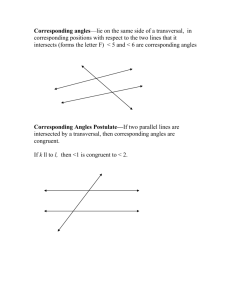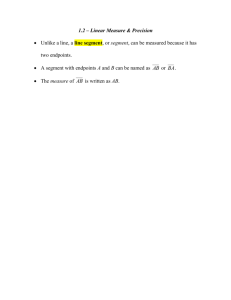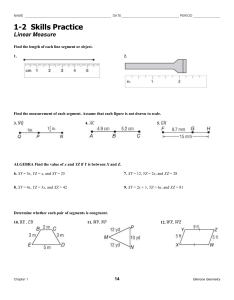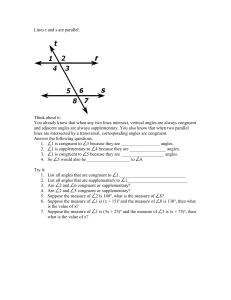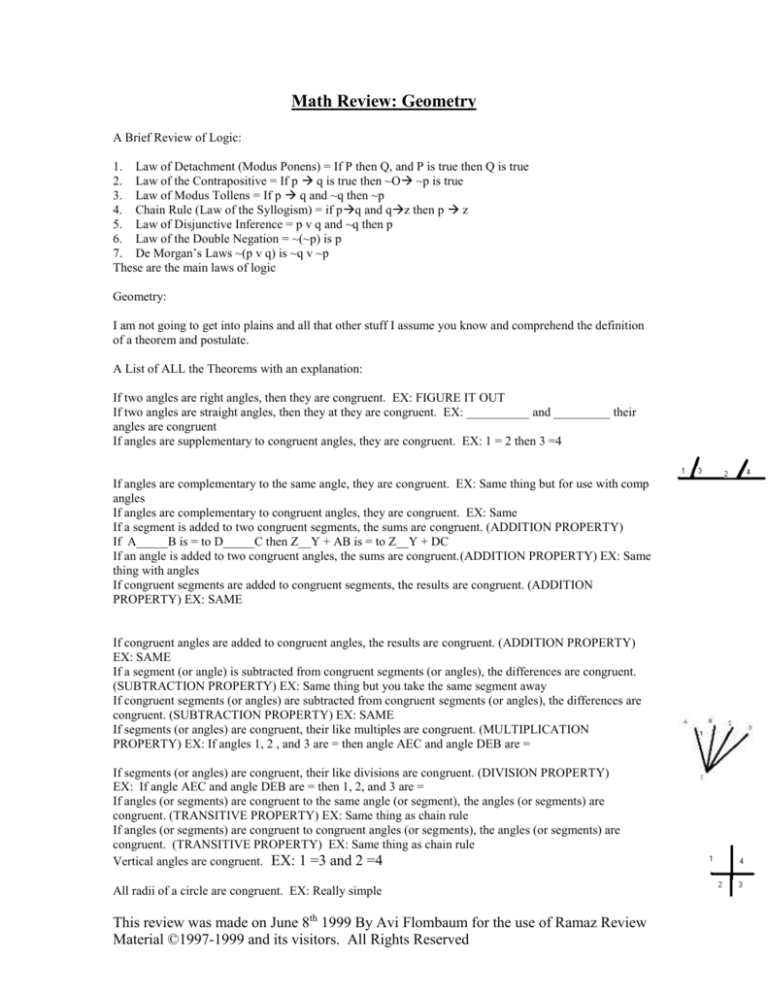
Math Review: Geometry
A Brief Review of Logic:
1. Law of Detachment (Modus Ponens) = If P then Q, and P is true then Q is true
2. Law of the Contrapositive = If p q is true then ~O ~p is true
3. Law of Modus Tollens = If p q and ~q then ~p
4. Chain Rule (Law of the Syllogism) = if pq and qz then p z
5. Law of Disjunctive Inference = p v q and ~q then p
6. Law of the Double Negation = ~(~p) is p
7. De Morgan’s Laws ~(p v q) is ~q v ~p
These are the main laws of logic
Geometry:
I am not going to get into plains and all that other stuff I assume you know and comprehend the definition
of a theorem and postulate.
A List of ALL the Theorems with an explanation:
If two angles are right angles, then they are congruent. EX: FIGURE IT OUT
If two angles are straight angles, then they at they are congruent. EX: __________ and _________ their
angles are congruent
If angles are supplementary to congruent angles, they are congruent. EX: 1 = 2 then 3 =4
If angles are complementary to the same angle, they are congruent. EX: Same thing but for use with comp
angles
If angles are complementary to congruent angles, they are congruent. EX: Same
If a segment is added to two congruent segments, the sums are congruent. (ADDITION PROPERTY)
If A_____B is = to D_____C then Z__Y + AB is = to Z__Y + DC
If an angle is added to two congruent angles, the sums are congruent.(ADDITION PROPERTY) EX: Same
thing with angles
If congruent segments are added to congruent segments, the results are congruent. (ADDITION
PROPERTY) EX: SAME
If congruent angles are added to congruent angles, the results are congruent. (ADDITION PROPERTY)
EX: SAME
If a segment (or angle) is subtracted from congruent segments (or angles), the differences are congruent.
(SUBTRACTION PROPERTY) EX: Same thing but you take the same segment away
If congruent segments (or angles) are subtracted from congruent segments (or angles), the differences are
congruent. (SUBTRACTION PROPERTY) EX: SAME
If segments (or angles) are congruent, their like multiples are congruent. (MULTIPLICATION
PROPERTY) EX: If angles 1, 2 , and 3 are = then angle AEC and angle DEB are =
If segments (or angles) are congruent, their like divisions are congruent. (DIVISION PROPERTY)
EX: If angle AEC and angle DEB are = then 1, 2, and 3 are =
If angles (or segments) are congruent to the same angle (or segment), the angles (or segments) are
congruent. (TRANSITIVE PROPERTY) EX: Same thing as chain rule
If angles (or segments) are congruent to congruent angles (or segments), the angles (or segments) are
congruent. (TRANSITIVE PROPERTY) EX: Same thing as chain rule
Vertical angles are congruent. EX: 1 =3 and 2 =4
All radii of a circle are congruent. EX: Really simple
This review was made on June 8th 1999 By Avi Flombaum for the use of Ramaz Review
Material ©1997-1999 and its visitors. All Rights Reserved
If two sides of a triangle are congruent, the base angles opposite them are congruent. EX: Isosceles
Triangle
If the base angles of a triangle are congruent, the legs opposite them are congruent. EX Isosceles Triangle
If two lines, rays, or segments intersect to form congruent adjacent angles, then the lines are perpendicular.
EX: In the diagram about vertical angles, if 1 = 4 and 3= 2 then those line would be perpendicular
If two points are each equidistant from the endpoints of a segment, then the two points determine the
perpendicular bisector of that segment. EX: IF BD and DC are = then D is the same distance from B and C
same with A. If that is true then A and D determine the Perpendicular Bisector.
If a point is on the perpendicular bisector of a segment, then it is Equidistant from the endpoints of that
segment. EX: If E is on the PB (perpendicular bisector) then it is Equidistant.
If a point is equidistant from the endpoints of a segment, then it lies on the perpendicular bisector of that
segment. (LIES ON THEOREM) EX: If BE and CE are = then E is on the PB
This review was made on June 8th 1999 By Avi Flombaum for the use of Ramaz Review
Material ©1997-1999 and its visitors. All Rights Reserved

